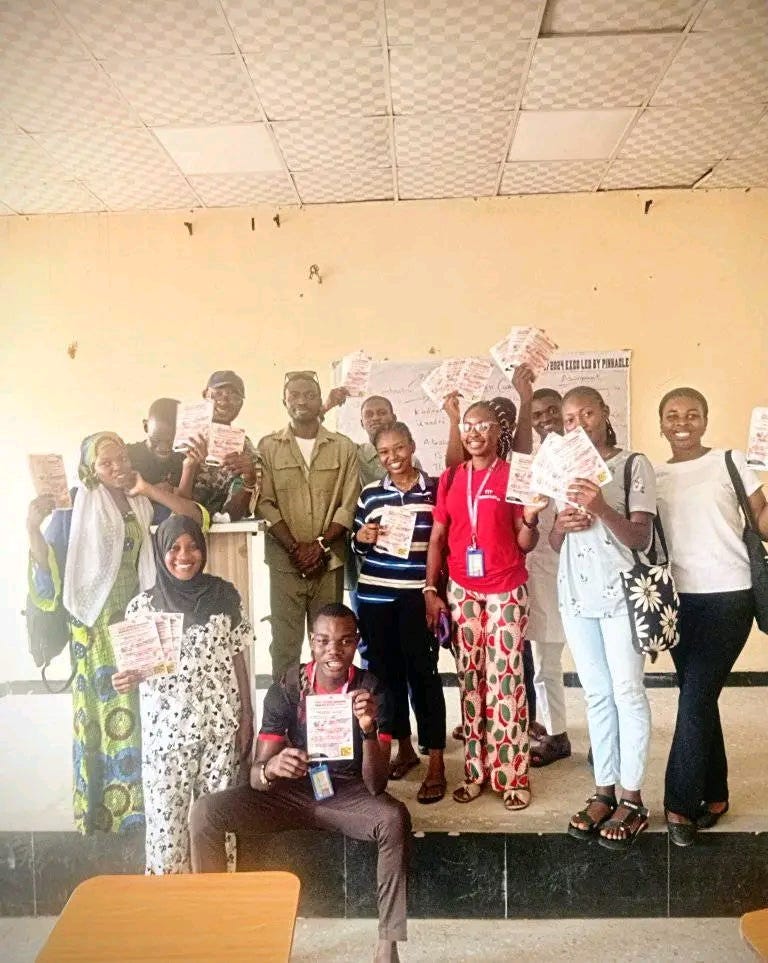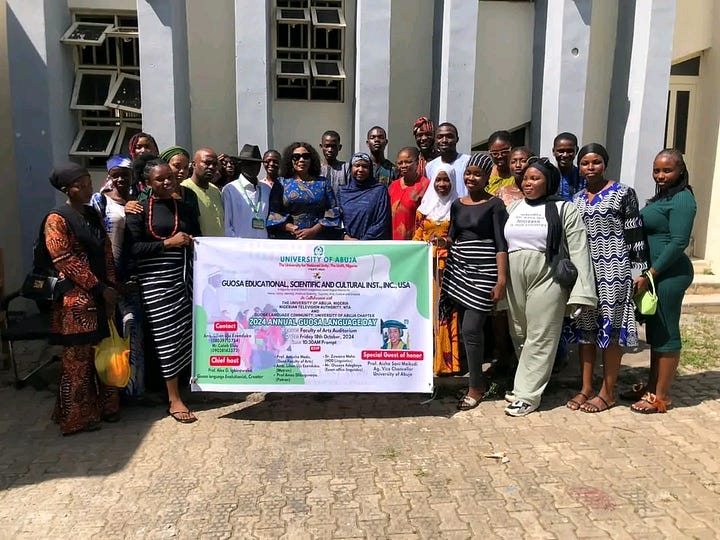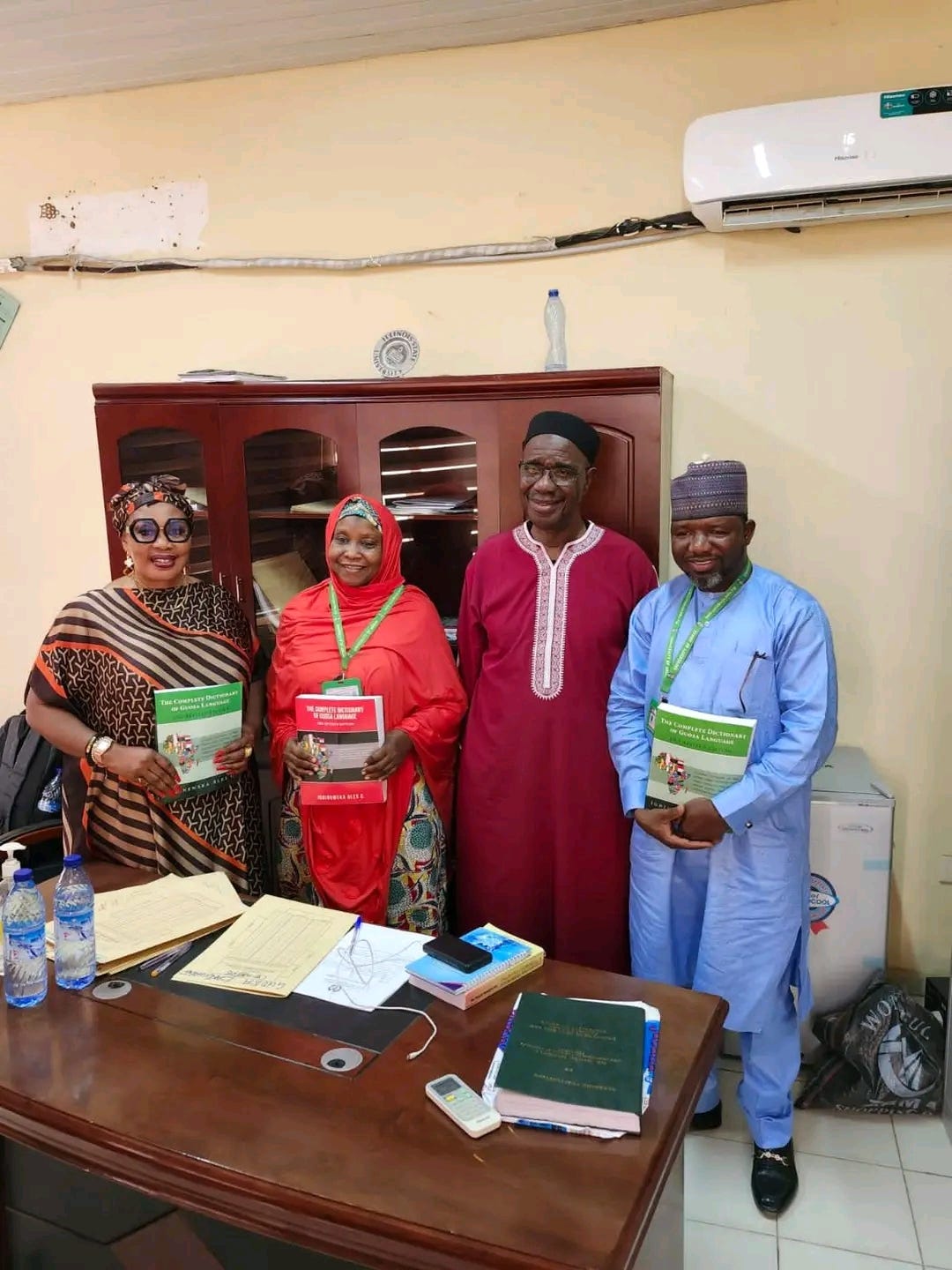Guosa: The language to unite West Africa strives on the tongues of Nigerian students
Part II: At the University of Abuja, Nigeria, students are at the forefront of driving Guosa language while government and institutional adoption slows.
Imagine this: It’s your first week at university, and a stranger approaches you raving about a language you’ve never heard of. Meet Guosa, a made-in-Africa language designed to unite 500+ West African tongues. Skeptical? So were these students… until they got hooked.
Their main academic mission on the campus of University of Abuja is to study Linguistics and African Languages. No one informs them that there is an ambitious language aiming to unite countries in the West African region.
Another day. The meeting is usually unscheduled. An individual walks up to the podium to speak about Guosa language. Guosa again, you mutter silently. Yet you listen.
In the introductory lecture to General Linguistics, your lecturers discussed artificial languages with the class, citing Esperanto and maybe Guosa as good examples.
So you remember; you know Guosa is a constructed language but you struggle to figure out its utility. You simply ask yourself why you should stay after normal school hours, to attend Guosa classes.
“It's just 1 hour every Wednesday”, you’re told. You attended the first session, then the second, two years later, your interest in the language has become overwhelming.

The “catch them young” phrase describes the sojourn of these students who are now dedicated to advancing Guosa language.
For the umpteenth time, they chorus and chant the Nigeria national anthem in Guosa language.
“The rhythm… the pitch… It’s incoherent. I need to hear the male bass voice… and the female soprano”, Madam Lillian Uju, Guosa matron coordinates the students, urging them to take note and start afresh.
Nigeria’s leadership suddenly becomes tantalised by the anthem bequeathed to the country by the British masters. While many Nigerians are yet to do away with the ‘Arise O compatriot’ anthem composed by a Nigerian, the adopted anthem has swiftly been translated into Guosa language, and the students are singing and memorising it ahead of the Guosa Cultural Day.


Thomas, Doris Williams, Christianah Okoh, Benedict Collete, Nelson Fidelis, Kudirat — all 200 level linguistics students at the time — make suggestions from time to time to improve the song, and drama performances. Despite academic busyness, the rehearsal continues for over two weeks, until D-Day.
Dramatisation of Guosa
The drama performance for the Guosa language Cultural Day can be summed up thus: my language – and yours – is here.
Imagine a multilingual speech community where inability of members to communicate effectively due to language differences is the fire fuelling conflict among them. Members have no total trust with anyone who speaks a different language, paving way for suspicion and crisis.
Amid the settlement of an inter-tribal feud at the palace, the cosmopolitan daughter of the king arrived. The king is at a crossroad when his daughter suggests the adoption of Guosa language, a language that eliminates miscommunication.
The narrative echoes the language’s aim to unite West Africa nations and foster effective communication across countries with over 500 languages.
“Language differences have always been an issue in (West) Africa”, Christianah, the student who acted the role of king’s daughter, says. “Guosa brings about a unified environment where you feel safe… where you understand each other.”
Another student, Doris sees Guosa language as a language that helps to bring people together. “Guosa promotes togetherness and enhances equality of languages. It somehow eliminates the feeling of language inferiority.”
You should not be surprised that these students know how to talk about language and related issues as they are linguists-in-training.
How far are the students ready to go?
In her first year on campus, Kudirat, a linguistics student, only joined one group: the Guosa Community; and after school, she wants to remain a member of the community. “I will continue to learn Guosa after school; at least I will still be on the Guosa WhatsApp community.”
Why? “The future of Guosa will be bright”, she believes.
Thomas, a fellow linguistics student, also shares the same view: “I want to be the first set of people who will start learning the language and also teaching it and also motivate others to start learning the language.”
Another student, Nelson Fidelis also says that he would like to continue to learn Guosa after school “because with the few classes I've attended I've picked interest.”
However, Guosa, despite its decade of promotion and development, has no known native speaker yet. This foregrounds the reality that Guosa is not widely spread in West Africa yet, and some Nigerian students are the only vanguard of the constructed language.
Only a few are aware that students in the U.K. are already learning the language meant for West Africa, according to the language creator, Prof. Alex Igbineweka.
It will not be okay if foreigners are later teaching W/African people Guosa, he often says.
But the reality is that there is a shortage of resources to go around for the few interested students in the only federal university in Nigeria’s capital city.
Doris feels “students’ attitude is not encouraging; they are not moved to learning languages. They are having apathy towards language learning. Public sensitization is very important.”
How far can the language go?
“The chance of Guosa serving the West African nations depends on how widely it spreads in a very short period of time”, Benedict Collete thoughtfully says.
“This depends on how much they spread the language and how interested people are in the language.”
The language community compiled and published a dictionary in 2016, including a detailed handbook in 2020. It also has a basic website, and online presence, too. It recently printed fliers, distributed to attract more students.
Occasionally, students chose to make Guosa language their subject of linguistic descriptions for their undergraduate projects. Eluu Caleb, a Guosa instructor, said he did the phonological description (how sounds are organised) of the language.
Though commendable, the efforts are not propelling the language enough. The student-learners see this, too.
“I believe it's easier for students to learn from quality materials. I don't think there are enough materials to learn this language”, Thomas says.
Renewed efforts to make Guosa one of the General Studies language courses are gaining attention from the school authority. Arabic, French, and Japanese are the languages courses taken within a session.

“If they are planning to make Guosa a general course, then there must be materials”, Thomas adds.
Materials are not enough, Collete opines. Language policy will play an important role in promoting the language beyond the four falls of the university.
“If it happens that Nigeria approves Guosa language as one of its official languages, it is going to play an important role in making Guosa a widespread language because it is going to be used in schools and various institutions”, she says.
“Even people who finished school before the policy came about will have to learn the language so as to be effective in their workplaces.”
Students attending Guosa sessions get certificates of participation and are often appreciated with snacks and drinks while they look forward to “opportunities that will come through Guosa language” in the future.
NOTE: We are able to interview mainly linguistics students currently in 300 level because they are the only consistent and dedicated members of the Guosa Community, University of Abuja, Nigeria.
Produced by:
Amina Abdulganiyu
Hassana Samuel
Quadri YahyaPLEASE leave a comment. You should also read the part I here.
Guosa: The language to unite West Africa strives on the tongues of Nigerian students
Students emptied out of the linguistics classroom for Guosa language students to come in. Mr and Miss Guosa, Pius Omoha and Waliyat Badmus, and other students in the department of Linguistics and African Languages filed in, enthusiastic about today’s session because it’s not just one of the Wednesdays dedicated to teaching and learning new vocabulary an…





Fantastic!! Guosa is the way to go!
Fantastic!! Guosa is the way to go!